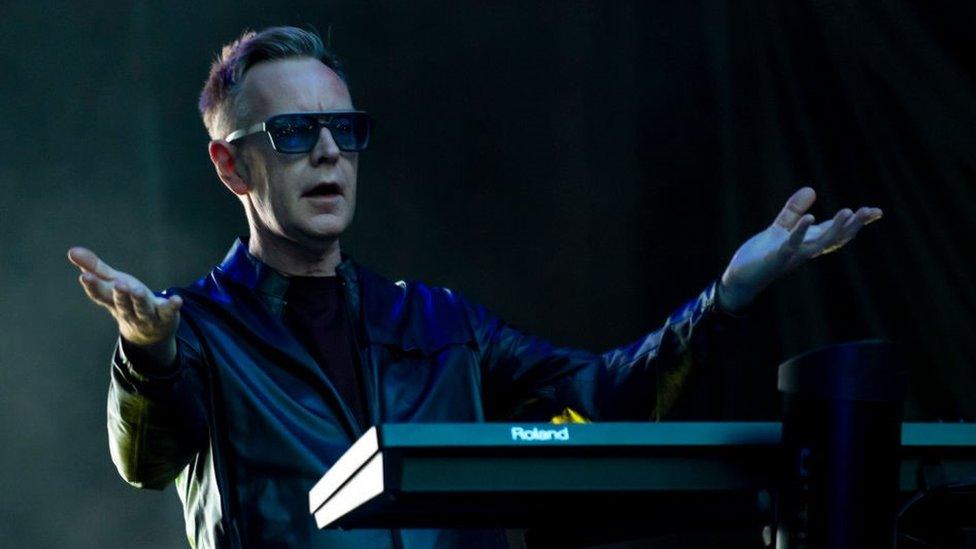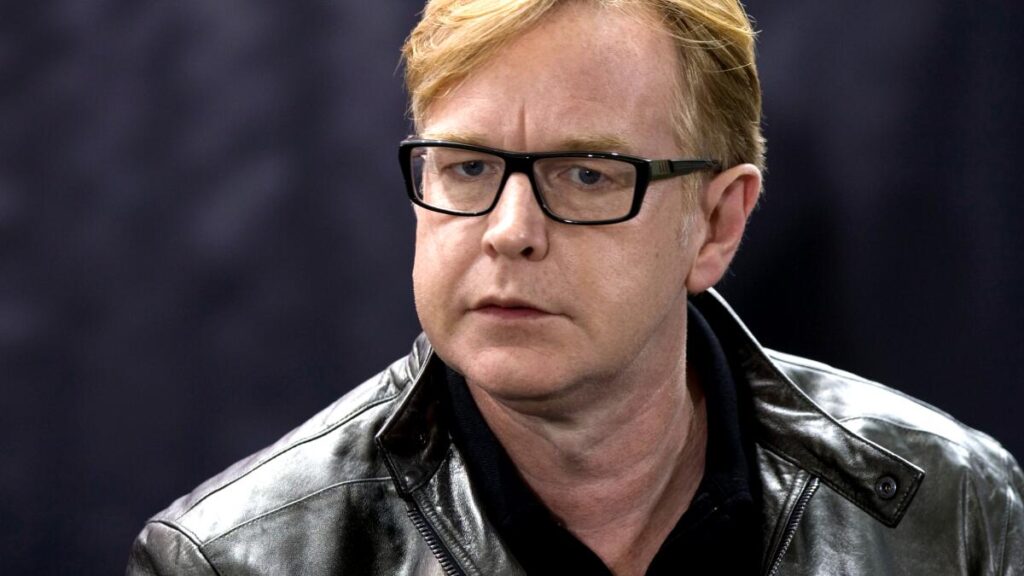
Andy Fletcher: A Founding Member of Depeche Mode
Andy Fletcher, affectionately known as “Fletch,” was a cornerstone of one of the most influential electronic bands of all time, Depeche Mode. Born on July 8, 1961, in Nottingham, England, Fletcher played a pivotal role in shaping the band’s sound, image, and global appeal. His contributions to the music industry, while often understated in comparison to some of his more flamboyant bandmates, were essential in maintaining the cohesion and longevity of Depeche Mode. Fletcher passed away on May 26, 2022, leaving behind a legacy that will forever resonate with fans of electronic music.
Early Life and Formation of Depeche Mode
Andrew John Leonard Fletcher was born into a working-class family in Nottingham and grew up in Basildon, Essex, where he met his future bandmates. Fletcher’s early interest in music was sparked by the post-punk and synthpop movement that was sweeping through the UK in the late 1970s and early 1980s. It was in Basildon that Fletcher met Vince Clarke and Martin Gore, two other budding musicians who shared his passion for creating electronic music. The three of them, along with singer Dave Gahan, would go on to form Depeche Mode in 1980.
Initially, Andy Fletcher played the bass guitar but soon transitioned to synthesizers as the band embraced the electronic sound that would define their music. His role in the band was more organizational and managerial in nature than that of a typical musician. He handled the band’s finances and often acted as a mediator during the frequent interpersonal conflicts that arose between band members, particularly during the later years. Nonetheless, his musical contributions, especially during the early stages of Depeche Mode’s development, were vital in laying the foundation for the band’s signature sound.
Depeche Mode’s Early Years and Success
Depeche Mode’s debut album, “Speak & Spell” (1981), propelled the band into the limelight with hit singles like “Just Can’t Get Enough.” At this time, Vince Clarke was the primary songwriter, and his bright, catchy melodies were a driving force behind the band’s initial success. However, following the release of the album, Clarke left the band to pursue other projects, leaving the rest of the group in a precarious position. It was during this transitional phase that Andy Fletcher’s stabilizing influence became particularly important.
Martin Gore stepped up as the primary songwriter, and under his guidance, Depeche Mode’s sound shifted towards darker, more introspective themes. Fletcher supported Gore’s new vision for the band, and his faith in the group’s future helped keep Depeche Mode together during this uncertain period. Albums like “A Broken Frame” (1982) and “Construction Time Again” (1983) marked the band’s evolution from poppy synth tunes to more industrial, melancholic soundscapes.
Andy Fletcher’s keyboard work may not have always been the focal point of the band’s music, but his steady presence, both on stage and behind the scenes, was essential in keeping Depeche Mode grounded during their rapid rise to stardom.
The Role of Fletch in Depeche Mode
One of the most interesting aspects of Andy Fletcher’s role within Depeche Mode was the somewhat enigmatic nature of his contributions. While Martin Gore was the chief songwriter and Dave Gahan became the charismatic frontman, Fletcher’s role was often described as more subtle. In interviews, he often downplayed his own musical abilities, referring to himself as the band’s “musical director” or joking that his primary job was “to look after the others.”
Fletcher’s influence, however, went beyond merely handling business matters. His ability to maintain peace and stability in a band that was frequently rocked by internal conflicts, personal struggles, and creative differences was no small feat. Depeche Mode experienced numerous challenges throughout their career, including Gahan’s struggles with addiction and Martin Gore’s creative pressures. Fletcher acted as a glue that held the band together during some of their most turbulent times.
Additionally, while he may not have had the spotlight, Andy Fletcher’s keyboard playing was integral to Depeche Mode’s live performances. His work, alongside fellow keyboardists Gore and Alan Wilder, created the dense, textured soundscapes that became synonymous with the band’s music. He was responsible for many of the repetitive, hypnotic synth patterns that defined Depeche Mode’s tracks, particularly in their earlier work. This steady presence gave the more experimental elements of the band’s music a solid foundation.
.
.
Achievements and Milestones
Depeche Mode achieved monumental success throughout the 1980s and 1990s, with Fletcher playing an integral role in that trajectory. Albums like “Black Celebration” (1986), “Music for the Masses” (1987), and the seminal “Violator” (1990) solidified the band’s place in the pantheon of electronic music giants. “Violator,” in particular, marked a turning point for Depeche Mode, catapulting them to global stardom with hits like “Personal Jesus” and “Enjoy the Silence.”
Andy Fletcher was instrumental in overseeing many of the business decisions that helped elevate Depeche Mode’s career. His role as the band’s de facto manager in the early years allowed the other members to focus more on their music. When the band began working with professional management teams, Fletcher continued to act as a liaison, ensuring that the band’s interests were always at the forefront. His attention to detail and pragmatic approach helped Depeche Mode avoid many of the pitfalls that often derail successful bands.
Despite his unassuming public persona, Fletcher was fiercely committed to Depeche Mode’s artistic vision. He believed deeply in the band’s music and was instrumental in pushing them towards new heights, both creatively and commercially.
Challenges and Conflicts
Like any long-lasting band, Depeche Mode had its fair share of internal strife. In the early 1990s, tensions between the band members were running high. Dave Gahan was struggling with addiction, and Martin Gore was feeling the immense pressure of being the band’s primary creative force. During this time, Alan Wilder, who had joined the band in 1982 as a keyboardist and music producer, became increasingly frustrated with what he saw as a lack of contribution from Fletcher. This culminated in Wilder’s departure from the band in 1995.
Andy Fletcher himself also experienced personal challenges. In 1994, he suffered a nervous breakdown, which forced him to temporarily step away from the band. This period of time was particularly tumultuous for Depeche Mode, as they were on the cusp of releasing their album “Songs of Faith and Devotion,” an album that would later be regarded as one of their best. Despite these difficulties, Fletcher returned to the band and played a key role in helping them recover from the turmoil.
.

.
The Later Years
Depeche Mode continued to thrive in the 21st century, with albums like “Exciter” (2001), “Playing the Angel” (2005), and “Delta Machine” (2013) reaffirming their status as pioneers of electronic music. Fletcher remained a vital part of the band, contributing to their studio recordings and live performances. His presence on stage during their sold-out world tours became iconic—often positioned behind his keyboard setup, sunglasses on, calmly playing his parts while Gahan and Gore captivated the audience.
In the later years of Depeche Mode’s career, Andy Fletcher also became more involved in DJing, performing at clubs and festivals around the world. His sets often featured a mix of electronic music and synthpop, reflecting his deep love for the genre that had defined his career.
Legacy and Passing
Andy Fletcher’s passing on May 26, 2022, at the age of 60, marked the end of an era for Depeche Mode. His death was met with an outpouring of grief from fans, fellow musicians, and music critics alike. While his contributions to the band may have often been understated, his impact was profound. As one of the founding members of Depeche Mode, Fletcher helped to shape the sound of modern electronic music and ensured that the band remained relevant for over four decades.
Depeche Mode’s influence on contemporary music is immeasurable. Bands like Coldplay, Nine Inch Nails, and The Killers have all cited Depeche Mode as a major influence. Fletcher’s role in that legacy may have been more behind-the-scenes, but it was no less significant. He was the steady force that kept Depeche Mode moving forward, through the highs and lows, ensuring that their music continued to reach millions of fans around the world.
In a music world filled with larger-than-life personalities, Andy Fletcher stood out as someone who let the music do the talking. His legacy as a founding member of Depeche Mode and as a pioneering figure in the world of electronic music will endure for generations to come.
Check out Depeche Mode on Amazon.
If you found this article interesting please share it with your friends and family, and why not check out some of our other articles on Musicians who died in 2022.
.

